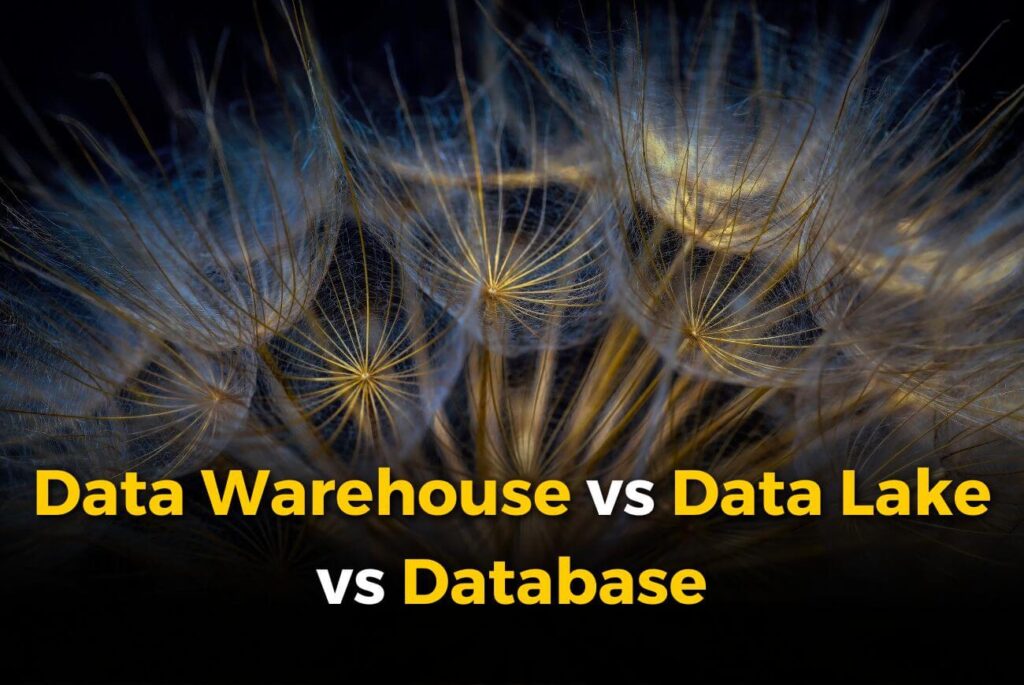In this article, we would discuss the differences between Data Warehouse vs Data Lake vs Database. We would also conclude its characteristic and their pros and cons.
Table of Contents
What is Data Warehouse?
A data warehouse is a single data store established for the purpose of supporting analytical reporting, decision-making, etc. It can provide various types of data, support enterprises in making various levels of decision-making, and provide support for data monitoring and business process improvement for enterprises with business intelligence needs. Many businesses need to hire professionals to handle a large amount of data in a Data Warehouse.
Data warehousing is a method for assembling and sorting data from many options of sources in order to obtain important business insights. Data warehouse refers to creating a database of information from business data and optimizing it for decision-making and analysis. Connecting and analyzing corporate data from many sources often involves the usage of a data warehouse.
The strategic use of data is facilitated by a combination of technologies and components. It’s when a company stores a lot of information digitally in a way that’s intended for analysis and searches rather than transaction processing. Making information quickly accessible to people and converting data into information is the process involved in this process.
Earlier, businesses began adopting data warehousing in basic ways. Data warehousing was eventually used in more complex ways, though.
Characteristics of Data Warehouse
- Efficiency is high enough – The analysis data of the data warehouse is generally divided into daily, weekly, monthly, quarterly, yearly, etc. It can be seen that the daily cycle data requires the highest efficiency, requiring customers to see yesterday’s data analysis within 24 hours or even 12 hours. Because some companies have a large amount of data every day, poorly designed data warehouses often cause problems, and the data can only be given after a delay of 1-3 days, which is obviously not possible.
- Data quality – The various information provided by the data warehouse must be accurate data, but because the data warehouse process is usually divided into multiple steps, including data cleaning, loading, query, display, etc., the complex structure will have more layers, and because of the unorganized data in the source, this could lead to data distortion. When customers see wrong information, they may make wrong decisions and cause losses instead of benefits.
- Expansibility – The reason why some large-scale data warehouse system architectures are complex is that the scalability in the next 3-5 years is considered. In this way, the data warehouse system can run stably without spending too much money to rebuild the data warehouse system in the future.
- Subject-oriented – The data organization of the operational database is oriented to transaction processing tasks, and each business system is separated from the other, while the data in the data warehouse is organized according to certain subject areas.
Advantages of Data Warehouse
- The operational value of business systems, particularly customer relationship management, can be increased by utilizing many data warehouses.
- Gives important information for business decisions.
- Enhances the standard of decisions taken.
- Particularly beneficial throughout the medium and long term.
- If the data sources and goals are clear, the systems are reasonably easy to set up.
Disadvantages of Data Warehouse
- Continuous data integration, transformation, and cleaning are necessary.
- Maintenance is difficult.
- Regarding the various objectives that an organization seeks to achieve, challenges may arise during the implementation process.
- Adding new data sources after implementation can be challenging.
- They necessitate a study of the storage as well as the data model, objects, transactions, and other elements.
- Their design is intricate and multifaceted.
- They necessitate reorganizing the operational systems.

What is Data Lake?
A large, conveniently located data repository called “Data Lake” is used to store “Big Data.” A data lake is intended to keep all attributes, especially when you are unsure of the extent of the data or its intended use, in contrast to standard data warehouses, which are optimized for data analysis by storing only some attributes and dumping data below the level aggregation.
The core value of “Data Lake” is to provide enterprises with a data platform operation mechanism. With the advent of the Digital era, enterprises are in urgent need of change. They need to use informatization, digitalization, and new technologies to form a platform system, empower the company’s personnel and business, and quickly respond to challenges.
Characteristics of Data Lake
- Raw data – Massive raw data is stored centrally without processing. A data lake is typically a single store for all an enterprise’s data, including raw copies of source system data, as well as transformed data for tasks such as reporting, visualization, analytics, and machine learning. Data lakes can include structured data from relational databases (rows and columns), semi-structured data (CSV, logs, XML, JSON), unstructured data (emails, documents, PDFs), and binary data (images, audio, video). That is, the data lake brings together different types of data.
- Flexibility – Using schema-on-read, a data lake adopts. It is better suited for businesses that are innovative and experience rapid company change and expansion.
- Manageability – The capabilities for comprehensive data management are provided by a data lake. A data lake stores both processed and unprocessed data, at a minimum. The data that is saved is always growing and changing. Strong data management capabilities, including knowledge of data sources, relationships, formats, and schemas, are required for this. A database and related tables, columns, and fields are included in a data schema.
Advantages of Data Lake
- Data in a data lake is closest to native. This brings great convenience to the needs of data exploration, and can directly obtain the original data.
- The data lake unifies the data of various business systems within the enterprise to solve the problem of information islands. It provides a possibility for data application across multiple systems.
- The data lake provides a global and unified overview of enterprise-level data, which is of great benefit to data quality, data security, overall data governance, and even the level of data assets.
- The data lake has changed the original working mode, encouraging everyone to understand and analyze data; instead of relying on the “supply” method of a dedicated data team, it can improve data operation efficiency, improve customer interaction, and encourage data innovation.
Also Read: Best web hosting providers for small business
Disadvantages of Data Lake
- The degree of data collection and processing is obviously lacking, and it seems a bit too “raw material” for users who try to use the data directly, and the data is too redundant. To deal with this problem can be solved by “Data access + Data processing + Data modeling“.
- There are high requirements for the performance of the data lake’s basic layer, and high-performance servers must be relied on for data processing. This is mainly due to problems caused by massive data, heterogeneous and diverse data, and delayed binding modes.
- Data processing skills are required. This is also mainly due to the problems caused by the data being too primitive.
- Problems with the quality of the data: Sorting through data lakes takes time. To manage and uphold data integrity, data lakes need regular data governance.
- Security hazards: Because a data lake contains a lot of data, security risks, and access control issues may occur. Without adequate supervision, certain sensitive data could reside in a data lake and be accessible to anybody.
What is a Database?
A database is a warehouse that organizes, stores and manages data according to the data structure. It is a collection of large amounts of data that is stored in a computer for a long time, organized, shareable, and managed in a unified manner. in short, used to store large amounts of data.
Types of Database
- Relational Database: A relational database is composed of a number of tables containing data that falls under a specific category.
- Distributed Database: Distributed databases are those where the processing is spread out or replicated among various points in a network and where elements of the database are kept in various physical locations.
- Cloud Database: A cloud database is a database that usually operates on a cloud computing platform. Access to the database is provided via the database service. The user is unaware of the underlying software stack thanks to database services.
Some Popular Database
Oracle database
The Oracle database management system is developed by Oracle Corporation and has always been in a leading position in the database field. At present, the Oracle database covers dozens of computer types such as large, medium, and small computers, and has become one of the most widely used relational data management systems (a database composed of two-dimensional tables and the relationships between them) in the world.
SQL Server database
SQL Server is a relational database management system developed by Microsoft Corporation, which has been widely used in e-commerce, banking, insurance, electric power, and other industries. SQLServer provides support for XML and Internet standards and has powerful, flexible, Web-based application program management functions.
DB2 database
DB2 database is a relational database management system which is developed by IBM in 1983. It is mainly used in OS/2, Windows, and other platforms. It has good scalability and can support large-scale computers to single-user environments.
MongoDB database
MongoDB is a product developed by 10gen between relational databases and non-relational databases. It is the most functional among non-relational databases and most similar to relational databases. The data structure it supports is very loose and is in the bjson format similar to JSON, so it can store more complex data types.
MySQL database
The MySQL database management system was developed by the Swedish company MySQL, but after several twists and turns, it is now an Oracle product. It is implemented in the “client/server” mode and is a small database server with multiple users and multiple threads. Moreover, MySQL is open source data, anyone can obtain the source code of the database and correct the defects of MySQL.
Sybase database
A relational database system developed by Sybase Corporation of the United States is a large-scale database system under the client/server environment on a typical UNIX or WindowsNT platform.

Advantages of Database
- Databases offer a structured method of organizing and storing data, making it simple to obtain and modify the data as required.
- Data integrity: Constraints and regulations, such as foreign key constraints and unique key constraints, are enforced by databases to guarantee the integrity of the data.
- Data security: To help prevent unauthorized access to the data, databases come with built-in security measures like user authentication and access control.
- Databases can quickly scale to handle increases in data volume and can manage massive amounts of data.
Disadvantages of Database
- High setup and upkeep costs: Creating and maintaining a database can be time and money-consuming.
- Database management and setup can be complicated and need specialized knowledge and abilities.
- Data breaches: Databases are susceptible to security flaws that may cause sensitive data to be lost or incorrectly accessed.
- Data corruption: Corrupt databases can cause data loss or system outages.
What is the difference between Data Warehouse and Database?
The main difference between Data Warehouse and Database :
1. The database is designed for transactions, and the data warehouse is designed for topics.
2. Databases generally store online transaction data, and data warehouses generally store historical data.
3. The database design is to avoid redundancy as much as possible, and the data warehouse is designed to introduce redundancy intentionally.
4. The database is designed for capturing data, and the data warehouse is designed for analyzing data.




